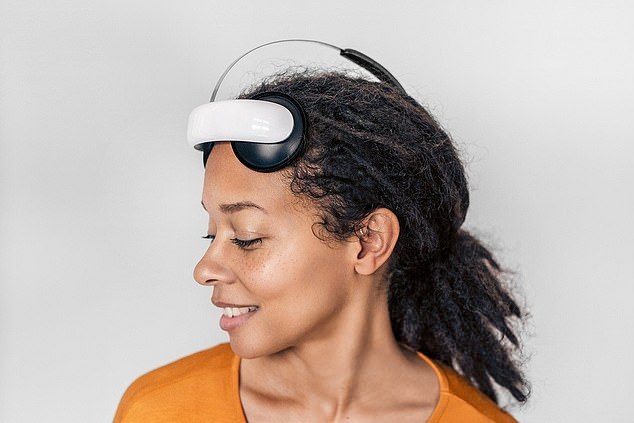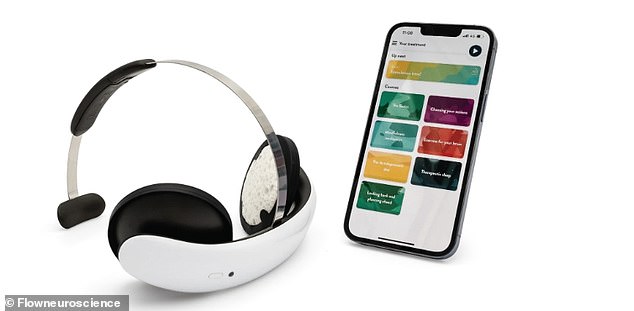An earpiece that appeared in a banned advert featuring reality TV star Gemma Collins may help stop depressed patients attempting suicide, according to an NHS trial.
Flow, a pulsating headset that purports to treat depression by sending electric shocks to parts of the brain responsible for regulating mood, reduced the incidence of suicidal thoughts by 75 percent in a group of 83 patients.
The hospital trust trialling the device saw a significant reduction in self-harm-related hospital admissions.
What’s more, a third of patients who used the device for six months were in remission from depression, reported the study authors, from Leicestershire Partnership NHS Trust.
The advert, which ran in May last year, drew the ire of the Advertising Standards Agency (ASA), which said the post breached rules designed to prevent adverts discouraging people from seeking treatment for medical conditions.
Leicestershire Partnership NHS Trust offered Flow depression treatment through its crisis service, which supports NHS patients who are at immediate risk of harming themselves or who are unable to cope with everyday life due to an acute mental health problem.
The six-month trial found that the wearable device helped patients stabilize quickly, with positive mood changes seen two to three weeks after treatment.
The makers of the Flow headset, which can be bought from traditional pharmacies for £399, describe it as a “wearable brain stimulation device” that harnesses a technology known as transcranial direct stimulation (tDCS).
In tDCS, small electrical currents (smaller than a household battery) are transmitted to the prefrontal cortex, which regulates emotions.
Over time, stimulation causes neurons to fire more frequently, strengthening neural pathways in the prefrontal cortex.
According to the company, clinical studies have shown that patients with depression have less activity in this area of the brain.
The headphones are supported by an app that allows users to record perceived benefits, which can be monitored remotely by a doctor.

According to the company, clinical studies have shown that patients with depression have less activity in this area of the brain, which is the part of the brain responsible for cognitive tasks and regulating emotions.
Crisis services provide prompt care and prevent escalation of mental health crises.
Wherever possible, the aim is to enable the patient to receive treatment safely at home rather than in hospital.
In the new trial, many patients who did not achieve remission still experienced a marked reduction in depressive symptoms after using the device for six months, and many went from severe to moderate or mild depression.
Dr Mark McConnochie, consultant psychiatrist and clinical director of urgent care services at Leicestershire Partnership NHS Trust, said: ‘Flow has been an incredible tool to safely and effectively help patients with depression recover faster.
‘Feedback from our patients and staff has been overwhelmingly positive, and the results of this trial are making a real difference to the lives of people across Leicester, Leicestershire and Rutland.’
Suicide and self-harm rates are rising and experts are calling for new approaches to treating depression.
NHS data from across the UK shows demand for mental health crisis services has doubled since 2017 and is up by around a third since before the pandemic.
More than 90,000 people are referred to community crisis services each month and 200,000 people call the NHS 24/7 crisis line each month.

The over-the-counter Flow headset is described as a “wearable brain stimulation device that leverages transcranial direct stimulation (tDCS) to activate the left dorsolateral prefrontal cortex,” parts of the brain responsible for mood regulation.
Support for depression can often be complicated as there is no one treatment that works for everyone.
Of about one in three people who went into remission or response after using Flow, 59 percent of the patient group had indicated they had already tried antidepressants and therapy.
This suggests the device could be used in patients who do not respond to other treatments.
Dr Sherif Abdalla, consultant psychiatrist CRHT at Leicestershire Partnership NHS Trust, said: ‘It’s wonderful to witness up close a major leap in the quality of treatment for patients with depression and suicide, which may soon change our treatment guidelines.
‘Thanks to Flow, patients return to their normal lives in a very short time and without worrying about side effects.’
The treatment is already available through five other NHS depression services.
The data validates results already seen in smaller NHS studies, which recognise headphones as a safe and effective treatment for depression.
However, an advertisement for the device had already been the subject of criticism.
In May last year, the Advertising Standards Authority (ASA) ordered Gemma Collins, who has 2.2 million followers on Instagram, to remove an advert for the device posted on her Instagram page.
The reality star claimed in the video that she had stopped taking antidepressants and said the device had been a “real game changer.”
He added: “Flow actually works faster and better than antidepressants.”
The post violated ASA rules designed to stop ads that discourage people from seeking treatment for medical conditions.
The ASA highlighted NHS advice that people with depression are not advised to stop taking medication for their condition without supervision.
In 2021, NHS watchdog NICE updated its guidance for psychiatric medication (taken by an estimated 8.6 million Britons) to say patients should wean themselves off drugs gradually as stopping them cold turkey could lead to withdrawal symptoms.
The doctors’ guidance recommends that patients be monitored while they stop taking antidepressants if they experience a mental health crisis.
The ASA concluded its ruling by stating that the advert advised against “essential treatment” for a medical condition and therefore breached the code.
Although the initial NHS trial has come to an end due to its success, researchers are keen to expand the use of this treatment for depression.
Erin Lee, CEO of Flow Neuroscience, said: ‘The Leicestershire results are very promising and add to our existing studies which demonstrate compelling evidence that Flow is an effective treatment for depression.
‘Depression is a very complex illness and it is vital that patients have more options.
‘With suicide rates rising rapidly, effective and accessible solutions that can be integrated into the health care system must be offered to help address the number of people suffering from the devastating consequences of the current mental health crisis.’


